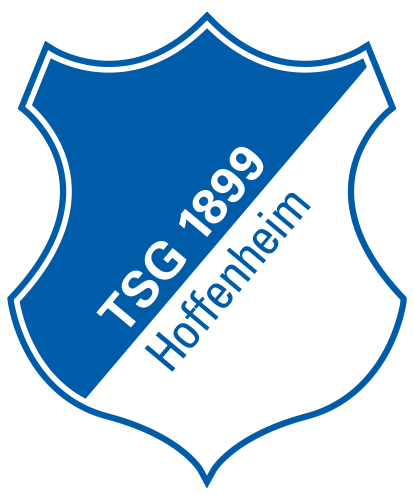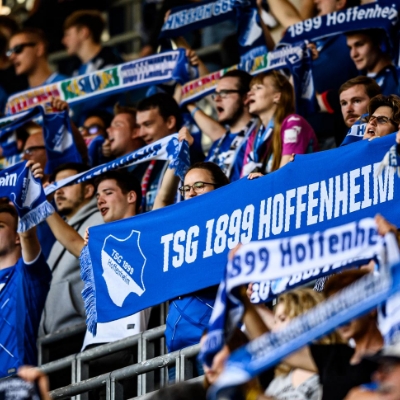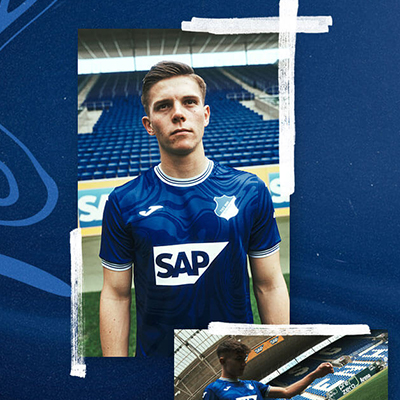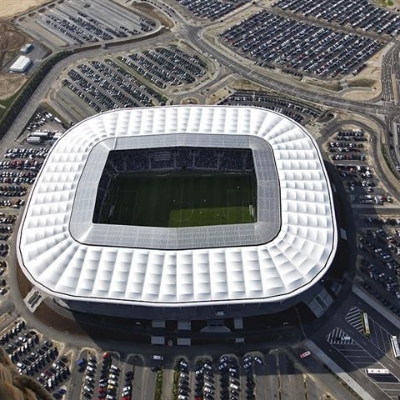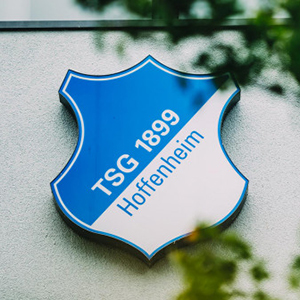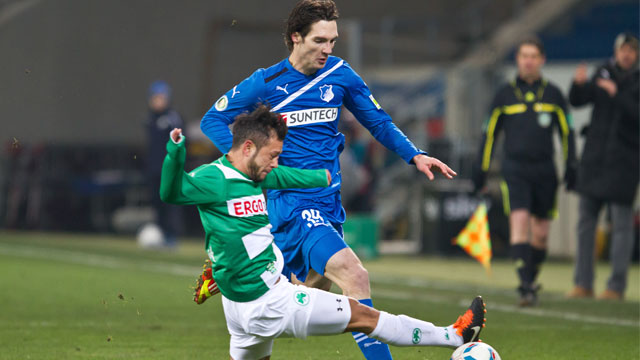Interview with Srdjan Lakic
Srdjan, you recently started training with a ball again. How is your rehabilitation from injury looking now?
We do a lot of work with and without the ball. That gives me a good feeling, as the injury threw me back a little.
And will you be in a matchday squad again soon?
Yes, I should be. If everything goes to plan, I should be back to full training with the squad this week. There's still a little work to be done before that though.
Hoffenheim have been under pressure of late, particularly in their attacking play. How hard is it for you not being able to help the team score goals right now?
There's nothing better than a derby; we saw that on Friday night. And I can tell you I didn't enjoy having to watch it from the stands one bit.
Shortly after your switch to 1899, you came up against your old colleagues at VfL Wolfsburg. What kind of an experience was that?
It was great, but mainly because we won the game and it was my first win as a Hoffenheim player. Those other stories are nice, but they shouldn't be blown out of proportion like they are in the media.
Only six months ago you were a 1. FC Kaiserslautern player, the team 1899 will be visiting in three weeks. What connection do you still have to the area?
I spent almost three years in Kaiserslautern and I had a great time. My son was born there, I achieved promotion with FCK and I had a great season for them on a personal level last year. I look back on my time there with a lot of pride.
Your hometown is Dubrovnik, Croatia. What sightseeing tips would you give for would-be visitors?
The Old City is a must-see. The history of the place is rich and colourful and there is a lot to do. And apart from that there are some great beaches. It's definitely a place worth going to. I go back twice a year to see friends and family.
You grew up in Dubrovnik and witnessed the civil war there. What are your memories of that?
They aren't good ones. I was lucky that I was still very young at the time and didn't see all that much of it, or didn't understand what I did see. Terrible things happened there, but you just have to try and forget and put it all behind you. That's what the people there are doing now and it's the only thing you can do.
What did those experiences teach you for later life?
I learned as a kid that life isn't always easy and that you have to fight to get through tough times. But I also know how important it is to be able to rely on friends and family. Perhaps experiences like that give you a stronger will, although I can't really confirm or deny that, because my situation was unique to me.
Who were your childhood heroes?
There were lots! I was always a big sports fan, even as a kid. Football was my passion and so I'd have to say that my role model was Davor Suker. He was the nation's hero. Back then there were more international stars from Croatia. I always liked Manchester United as well. When I scored my first club goal at the age of eleven, I was given a Manchester United shirt as a present.
It seems the whole of Croatia is sport-crazy. Did you ever play another sport besides football?
I used to play water polo; it's always been a big thing in Dubrovnik. Almost every kid who is born there starts off with water polo, and that was the same for me.
How long did you pursue it for?
(Laughing) Not long, to be perfectly honest. It just wasn't my sport. I always looked for an excuse not to go to training. Whenever I did go, I rarely set foot in the swimming pool, but did kick-ups with the balls instead. Then my mother stopped me going because I was always ill. At the time we had an outdoor pool, and we used to train even in October and November, when it was really cold.
Describe your footballing education in Croatia?
It was completely different to Germany. We didn't have much infrastructure or many able coaches. I'm lucky, really, that I managed to reach this level of the game without those conditions in place when I was young.
How big is the difference between the German Bundesliga and the Croatian league that you used to play in?
It's a difficult comparison to make, because the Bundesliga is one of the strongest leagues around, perhaps even the strongest, in relation to the quality of its players. Croatian football is still a few years behind, and there still needs to be a few changes made before it can be compared with the Bundesliga. I hope that the people in charge can introduce those changes, since we have more than enough talented players.
Tell us about the atmosphere in Croatian stadia.
That always varies. When I first started playing in the Croatian league, the stadia were well filled and the atmospheres were great, especially at derby games. Some of the fans, particularly those from the south, are famous for displaying their emotion, and that created a great feeling. But that has died down in recent years, and now a lot of the matches attract just a few thousand fans.
Your reputation is of a classic, old-fashioned centre forward, and those players are judged by how many goals they score. How do you feel about such labels?
It's a help and a hindrance really. Sometimes it's unfair that a player is judged solely on his goals record; a striker can still have a good game, even if he doesn't score. But as a striker, scoring also allows you to put a bad game behind you, or it means that you didn't have a bad game after all. If I do nothing in a match for 90 minutes, but then score the winner in the 91st minute, then I'm the match-winner. From that perspective, a striker shouldn't put himself under too much pressure. And as you get older, you learn to take less notice of what other people say or write about you anyway.
You are one of the more experienced players in the Hoffenheim squad. Do you feel like a key player in the team?
I think that's for others to decide. Of course I give the other, younger guys in the squad the odd tip here and there, because I do have more experience than them. But even as a 28-year-old you can still learn something from the younger players.
How do you think football has changed in the last few years?
Fitness and rehabilitation have become increasingly important. Almost every team nowadays plays with a fast, intensive and compact system, and that takes a lot out of you as a player. Without a decent level of fitness, you're nothing. Team togetherness has also become a big part of the modern game. If you want to press the opposition in a match, you have to do it as a team and hunt in packs. That means what you do as an individual is less important. Successful clubs are ones that play as a team.
And finally, what will Hoffenheim achieve this season?
There's still a lot to play for in the remaining eight matches. We've lost our last two games, but the squad has huge potential still. But if we can reproduce the performances we showed against Werder Bremen or VfL Wolfsburg, then we can definitely enjoy a successful end to the season.


